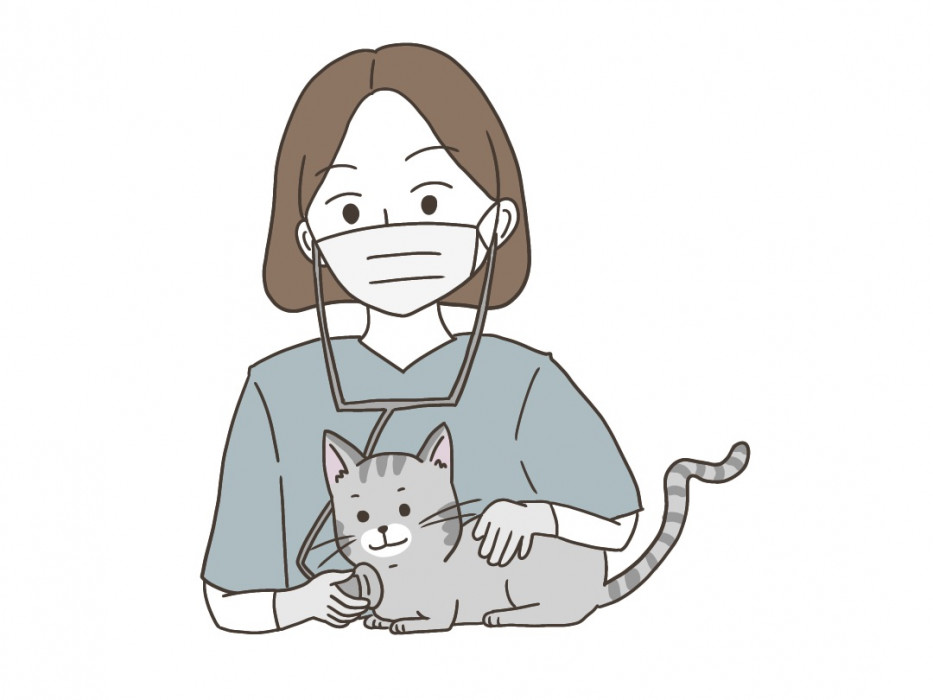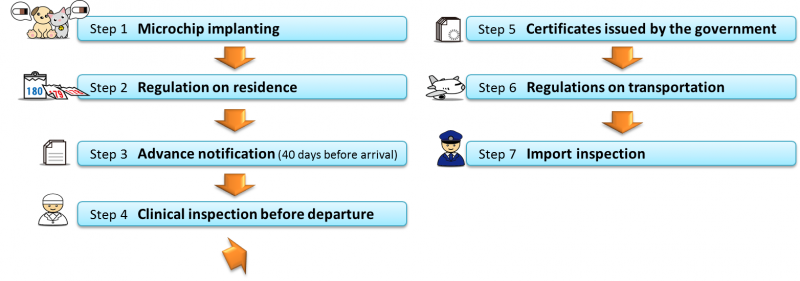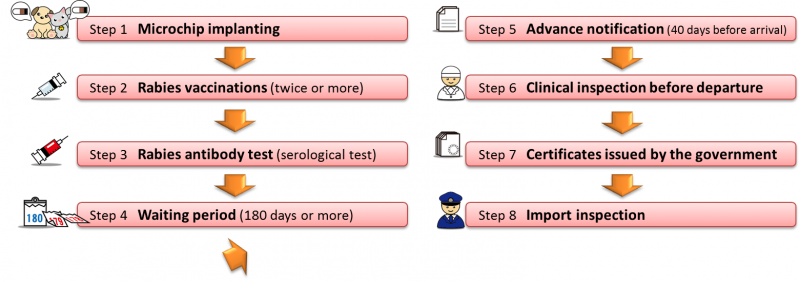Making the big move to Japan but not wanting to leave your beloved cat behind? In this article, we cover all you need to know about bringing your cat to Japan. From a handy checklist of things to consider, evaluating if your cat is ready for the trip, and the all-important procedure to follow.
Table of Contents
- Checklist of Things to Consider Before Keeping a Cat in Japan
- Evaluate Your Cat’s Condition
- How to Bring Your Cat or Dog to Japan
- Takeaway
Checklist of Things to Consider Before Bringing Your Cat to Japan

-
Is your cat up for travelling?
-
Can you cover the costs to migrate your cat?
-
Are you ready to deal with the tedious task of importing your cat?
-
Do you have enough space in your Japanese home for your cat to run around comfortably?
-
Do you have permission to keep a cat at your Japanese housing?
-
Are you financially ready to provide for a cat in Japan?
-
Even for veterinary costs and emergencies?
-
Even for the cat’s whole lifespan which averages 15-25 years old?
-
Do you have time to care for your cat with your new responsibilities in Japan?
-
Not just daily necessities, what about time for play and cuddles?
-
Who will care for your cat when you’re away, especially if you’re visiting your home country?
-
How long are you staying in Japan?
-
What would you do with your cat if you ever decided to leave Japan?
Writer's Pick
Evaluate Your Cat’s Condition

Well before you start the process of relocating your cat, you’ll need to check your cat’s health and see if there’s anything you can do to make the trip more comfortable for him/her. Or, if he/she really can’t make the trip, consider your options - let family / friends take care of your cat, cancel / delay your move until ready, etc.
Age
Cats are considered elderly or senior when they reach 10 years of age. At this age, they start to slow down more, nap a lot, and become more likely to develop certain diseases like arthritis, diabetes, and kidney problems.
This does not mean an automatic “no relocation overseas”, as it really depends on your cat. But still, it’s something to seriously consider as the move would be more of a burden on a senior than a young cat.
What can you do?
-
Consult with a veterinarian.
-
Special arrangements for a more comfortable trip.
-
Research about veterinary costs in Japan, pet insurance, treatment, etc.
Stress Tolerance

Some cats are super chill whilst some are just naturally more anxious. If your cat is prone to stress, chances are they don’t adjust well to environmental changes, don’t travel well, and can’t stand strangers. So this exciting trip may be hell to your cat.
What can you do?
-
Start pet carrier/crate training early.
-
Try to get a direct flight, or at the least few stops so you can reach your destination as soon as possible.
-
Try calming products like pheromones, herbs, and sprays when your cat is in the carrier.
-
Leave your cat alone for a few days when arrived in Japan to get used to being in a new place.
Current Health Condition & History of Illness
Sickly, injured, pregnant, elderly cats are not recommended for travelling. Not to mention, if it is a chronic condition you’ll need to consider the veterinary costs you will incur in Japan - Is the same treatment available? Can you afford it?
What can you do?
-
Consult a veterinarian on your cat’s condition, recovery, treatment, needs, etc.
-
Research about veterinary costs in Japan, pet insurance, treatment, etc.
Vital Thing to Note
If you fail to satisfy the import requirements, your cat will need to be quarantined (up to 180 days) or not allowed to enter Japan. We can’t stress how important this is especially for senior cats, easily-stressed cats, and sick cats who may become separated from you in a foreign land.
How to Bring Your Cat or Dog to Japan

For more information on how to bring your cat or dog to Japan, the Ministry of Agriculture, Forestry and Fisheries (MAFF) has provided a comprehensive guide you can find here:
Quarantine System for Dogs and Cats (Import)
Summary of What You Need to do to Import Pet to Japan
First things first, make sure you refer to the correct guide. Note that import procedures for designated regions and non-designated regions differ.
For Designated Regions (Iceland, Australia, New Zealand, Fiji Islands, Hawaii, Guam)

Image Credit: ⓒ Animal Quarantine Service
-
Microchip Implant
-
180 days resident in designated country, or resident in designated region since birth, or resident in designated region since direct import from Japan
-
Advance Notification (at least 40 days before Japan arrival)
-
Pre-departure Clinical Inspection
-
Acquire Certifications Issued by Country of Export’s Government Institution
-
Direct Travel/Transport to Japan, if possible. If not possible, additional documents and regulations are required.
-
Inspection Upon Arrival in Japan
Check the link below for detailed information including necessary documents, required information on documents, required forms (template provided), and necessary procedures in Japan.
※ MAFF Animal Quarantine Service, “Import dogs and cats into Japan (from the designated regions)” “FAQ Bringing dogs and cats into Japan from abroad”
For Non–Designated Regions (Any Other Country)

Image Credit: ⓒ Animal Quarantine Service
-
Microchip Implant (before rabies vaccination)
-
Rabies Vaccination (at least 2 jabs)
-
Rabies Antibody Test (test done by designated laboratories only)
-
At Least 180 days Waiting Period
-
Advance Notification (at least 40 days before Japan arrival)
-
Pre-departure Clinical Inspection
-
Acquire Certifications Issued by Country of Export’s Government Institution
-
Inspection Upon Arrival in Japan
Check the link below for detailed information including acceptable rabies vaccines, vaccine effective period, F.A.Q.s, necessary documents, required information on documents, required forms (template provided), and necessary procedures in Japan.
Info: Japan has been rabies-free since 1957 and they intend to keep it that way with strictly enforced animal import regulations.
※ MAFF Animal Quarantine Service, “Import dogs and cats into Japan (from Non-designated regions)” “FAQ Bringing dogs and cats into Japan from abroad” “Rabies”
Important Things to Know

-
If you fail to satisfy the import requirements (whether due to document error, waiting period not satisfied, or other reasons), your pet will need to be quarantined (up to 180 days, and incur costs) or not allowed to enter Japan.
-
Check that your pet carrier / pet crate is compliant with airline policies.
-
Check airline pet policies before booking:
-
Not all airlines allow pets.
-
Some airlines only allow pets in cargo, but depending on your pet’s health and stress tolerance, cargo may not be recommended.
-
Pay attention to weight limit and pet carrier size/dimensions.
-
Takeaway

Ohana means family, family means nobody gets left behind or forgotten.
- Lilo and Stitch, Disney
Do your best to bring your cat with you if there’s no one left to care for them in your home country. You may have many cats in your lifetime, but for her/him, there’s only one human and that’s you.
Despite the stressful and tedious task that bringing pets to Japan can be (countless people complain about it), one thing all those pet owners agree on is that "it’s definitely worth it" and they "wouldn’t have it any other way". If the process is too much for you, there’s always pet relocation services that can help you out.
All our cat related articles can be easily found here:
Cats in Japan, Find All You Need to Know About Japan’s Cats in One Page






















.jpg)













